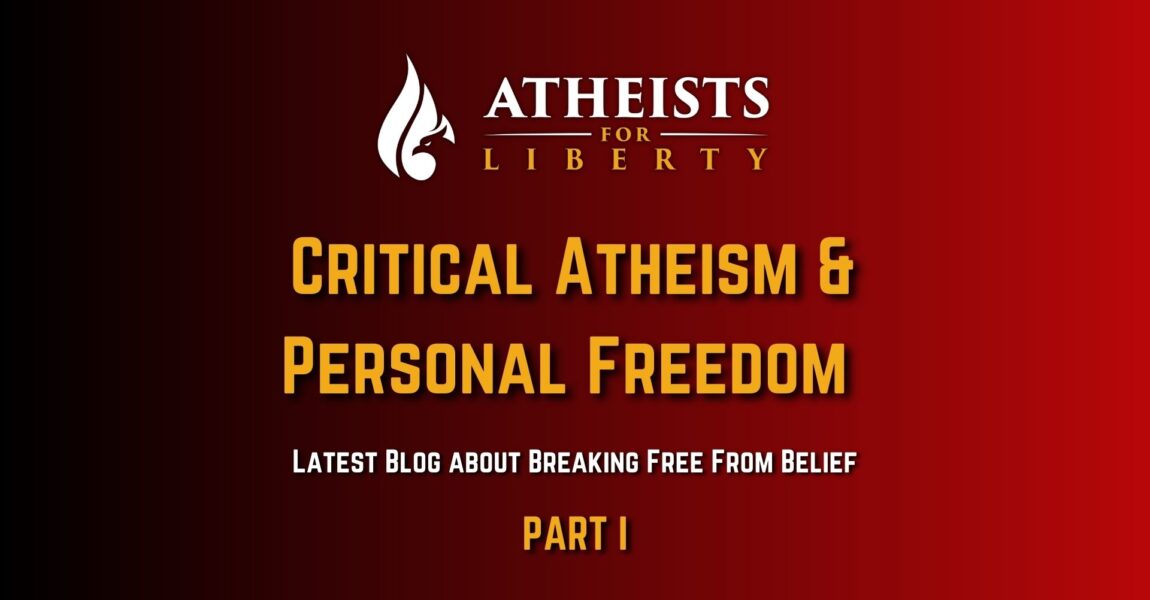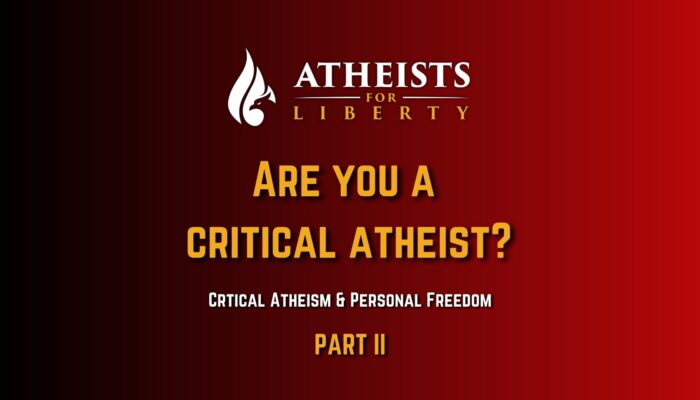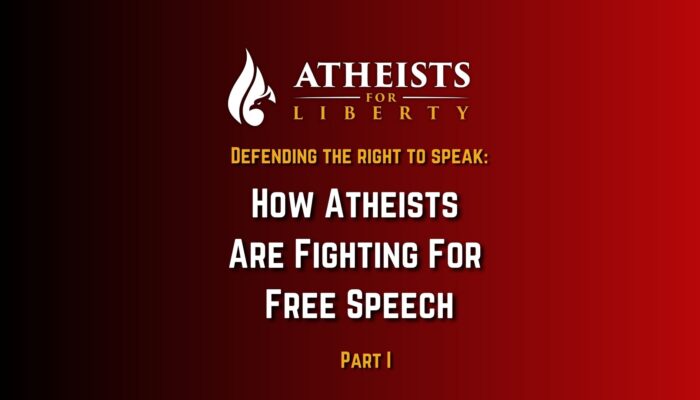
Critical Atheism and Personal Freedom: (part I)
Breaking Free from Belief
In this blog post, we will explore the concept of critical atheism and its relationship to personal freedom. Critical atheism is a philosophical position that emphasizes the importance of critical thinking, skepticism, and rational inquiry in the rejection of religious beliefs and practices. It asserts that individuals should not simply accept religious dogma without question, but should engage in a process of intellectual inquiry to determine what is true and what is false. This can be a challenging and often uncomfortable process, but it is ultimately necessary for individuals to break free from the constraints of belief and achieve true personal freedom.
The Origins of Critical Atheism
So, critical atheism emerged in the late 19th and early 20th centuries as a reaction to the dominance of religion in Western society. Philosophers such as Friedrich Nietzsche and Karl Marx criticized religion as a tool of power and domination, used by ruling elites to maintain social control over the masses. They argued that individuals should reject religious beliefs and practices in favor of reason, science, and humanistic values.
The Principles of Critical Atheism
Thus, the principles of critical atheism are based on the rejection of religious dogma and the importance of critical thinking, skepticism, and rational inquiry. Critical atheists argue that religion is not only false but also harmful, perpetuating ignorance, intolerance, and oppression. They emphasize the need to challenge religious beliefs and practices through the application of reason and evidence, and to embrace a humanistic worldview that emphasizes the value and dignity of all individuals.
The Relationship Between Critical Atheism and Individual Freedom
Therefore, critical atheism is closely linked to the concept of personal freedom. By rejecting religious beliefs and practices, individuals can break free from the constraints of tradition, authority, and dogma, and achieve a greater degree of intellectual and moral autonomy. This can be a challenging and difficult process, but it is ultimately necessary for individuals to live fulfilling and meaningful lives.
The Importance of Critical Thinking and Rational Inquiry in Critical Atheism
Accordingly, critical thinking and rational inquiry are essential components of critical atheism. These skills allow individuals to challenge religious beliefs and practices, and to evaluate claims based on evidence and reason. They are also essential for developing a humanistic worldview that values individual freedom, tolerance, and compassion.
The Role of Critical Atheism in Challenging Religious and Social Institutions
With this in mind, critical atheism plays an important role in challenging religious and social institutions that perpetuate ignorance, intolerance, and oppression. By exposing the flaws and inconsistencies in religious beliefs and practices, critical atheists can inspire individuals to question and challenge traditional sources of authority and power. This can lead to social and political change, as well as greater individual freedom and autonomy.
Critical Atheism and the Human Condition
Furthermore, critical atheism addresses many of the fundamental questions of the human condition, including issues of mortality, meaning, and purpose. By rejecting religious beliefs and practices, individuals can embrace a more humanistic worldview that values reason, science, and human flourishing. This can provide a framework for living a fulfilling and meaningful life, based on personal autonomy and the pursuit of individual and collective happiness.
The Ethics of Critical Atheism
For this reason, the ethics of critical atheism are based on a commitment to reason, evidence, and humanistic values. Critical atheists reject the notion that morality comes from religious dogma, and instead embrace a secular ethics based on compassion, tolerance, and respect for individual autonomy. They believe that individuals have a moral responsibility to live ethical and meaningful lives, and to work towards the betterment of society as a whole.
The Challenges of Being a Critical Atheist in a World Dominated by Religious Belief
That said, being a critical atheist in a world dominated by religious belief can be challenging. Many people find comfort and meaning in their religious beliefs, and may view criticism of those beliefs as a personal attack. This can lead to hostility, social ostracism, and even violence in some cases. Additionally, many critical atheists face pressure from family members, friends, and society at large to conform to religious beliefs and practices.
Moreover, religious belief often plays a significant role in politics, education, and other aspects of society. This can make it difficult for critical atheists to have their voices heard and to make a meaningful impact on public discourse. In some countries, critical atheists may face legal or even physical persecution for their beliefs, and may be forced to hide their true beliefs or face serious consequences.
Despite these challenges, critical atheists have a vital role to play in promoting rational inquiry, scientific literacy, and humanistic values. They can provide a voice for those who have been marginalized or oppressed by religious institutions, and can challenge the status quo in meaningful ways. Ultimately, the challenges of being a critical atheist in a religious world highlight the importance of promoting tolerance, open-mindedness, and critical thinking, and of working towards a more just and compassionate society.
The Future of Critical Atheism
So while the future of critical atheism is uncertain, it is clear that the movement has already had a significant impact on religious and philosophical discourse. Critical atheists have played an important role in challenging religious authority and promoting rational inquiry, skepticism, and humanistic values. They have inspired individuals to question and challenge traditional sources of authority and power, and to embrace a more critical and skeptical approach to knowledge and belief.
However, the future of critical atheism is also shaped by broader societal and political trends. In recent years, there has been a rise in populist movements, nationalism, and anti-intellectualism, which can pose a threat to the principles of critical thinking and rational inquiry. These trends can lead to a rejection of evidence-based knowledge, and a retreat into tribalism and dogmatism.
Debate about Critical Atheism
Additionally, there are also debates within the critical atheist community about the role and scope of the movement. Some argue that critical atheism should focus primarily on challenging religious beliefs and practices, while others believe that it should address broader issues such as social justice, environmentalism, and human rights. There are also debates about the relationship between critical atheism and other philosophical and political movements, such as secular humanism, Marxism, and feminism.
But, despite these challenges, critical atheism continues to be an important force for intellectual and moral autonomy, and for promoting humanistic values in a world that is often dominated by ignorance, intolerance, and oppression. It remains to be seen how the movement will evolve in the coming years, but it is clear that the principles of critical thinking, skepticism, and rational inquiry will continue to be essential for promoting personal freedom, and human flourishing. As such, the future of critical atheism will likely depend on the ability of individuals to embrace these principles, and to work towards a more rational, compassionate, and just society.
Ready for a Life of Critical Inquiry?
In conclusion, critical atheism offers a unique perspective on personal freedom and the role of belief in our lives. By challenging traditional sources of authority and promoting evidence-based reasoning, critical atheists can empower individuals to break free from the constraints of belief and to embrace rational inquiry, skepticism, and humanistic values. While the challenges of being a critical atheist in a religious world are significant, the connection between critical atheism and the importance of promoting rational inquiry, and humanistic values, in all aspects of society. So, if you’re ready to break free from belief and embrace a life of critical inquiry and personal freedom, then critical atheism may just be the path for you!
Make sure to look out for part II of Critical Atheism & Personal Freedom!
Don’t let belief hold you back from living the life you want. Join the critical atheist community and start living a life of rational inquiry, skepticism, and humanistic values.
Become a member to join the movement!
Check out Atheists for Liberty on Facebook, Instagram, Twitter, Gettr, and YouTube.
Sources:
Bridgstock, M. (2012). Atheism and Critical Thinking. In R. F. Caso & A. S. McMullen (Eds.), The Oxford Handbook of Atheism (pp. 315-330). Oxford University Press.
Dawkins, R. (2006). The God Delusion. Houghton Mifflin.
Dennett, D. C. (2007). Breaking the Spell: Religion as a Natural Phenomenon. Penguin.
Harris, S. (2005). The End of Faith: Religion, Terror, and the Future of Reason. W. W. Norton & Company.
Herrick, J. (2014). Humanism: An Introduction. Bloomsbury Publishing.
Hitchens, C. (2007). God Is Not Great: How Religion Poisons Everything. Twelve.
Hitchens, C. (Ed.). (2007). The Portable Atheist: Essential Readings for the Nonbeliever. Da Capo Press.
Russell, B. (1957). Why I Am Not a Christian and Other Essays on Religion and Related Subjects. Routledge.
Smalkoski, K., & Riley, K. (2018). Critical Atheism: An Examination of Critical Thinking and Atheism in the Classroom. Teaching Theology & Religion, 21(3), 174-183.
Zuckerman, P. (2010). Atheism: Contemporary Rates and Patterns. In M. Martin (Ed.), The Cambridge Companion to Atheism (pp. 47-65). Cambridge University Press.

